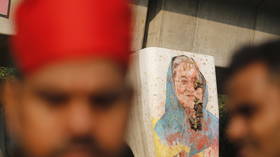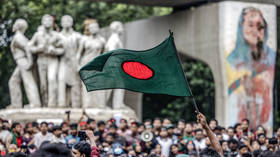Bangladesh court seeks arrest of ousted PM

A court in Bangladesh is seeking the arrest of former prime minister Sheikh Hasina for alleged crimes against humanity, over a crackdown on student-led protests earlier this year.
Hasina’s Awami League was ousted from power in August following weeks of unrest, in which more than 700 people died according to the interim government formed after her resignation.
The chief prosecutor of the country's International Crimes Tribunal (ICT) said on Thursday that the court had issued arrest warrants for Hasina, aged 77, along with 45 other individuals, ordering that they attend court by November 18.
Hasina fled to India after she resigned on August 5, and remains there. Since her departure, numerous criminal cases have been opened against the former premier and her aides, on charges of murder, torture, abduction, crimes against humanity, and genocide.
The new interim government in Dhaka has revoked Hasina’s diplomatic passport.
India and Bangladesh have an extradition treaty in place that could allow for Hasina’s return to face trial. However, the treaty allows for a country to refuse extradition on “political” grounds.
When asked about the warrant, the spokesperson for India’s foreign ministry declined to comment, saying Hasina had come to India at “short notice for safety reasons.” Indian Foreign Minister S. Jaishankar, addressing an event in August, mentioned that Hasina was in a state of “shock” and that New Delhi was giving her time to recover before it spoke to her over her future plans.
The Bangladeshi interim government is headed by Nobel Peace Prize-winning economist Muhammad Yunus. The country has not held an election since the tumult, and no election date has been announced so far.
New Delhi’s relations with Dhaka have been tested since the ouster of Hasina. The Bangladesh Nationalist Party (BNP), the country’s main opposition party, has warned that Hasina’s extended stay in India could put a further strain on bilateral ties, and has been pressing for the former leader’s extradition.
India has expressed concern over alleged atrocities against the Hindu minority in Bangladesh, which makes up 9% of the population, since the fall of Hasina’s government. New Delhi has formed a special committee to investigate the alleged atrocities and monitor the border, where large numbers of people have been attempting to cross into India.













